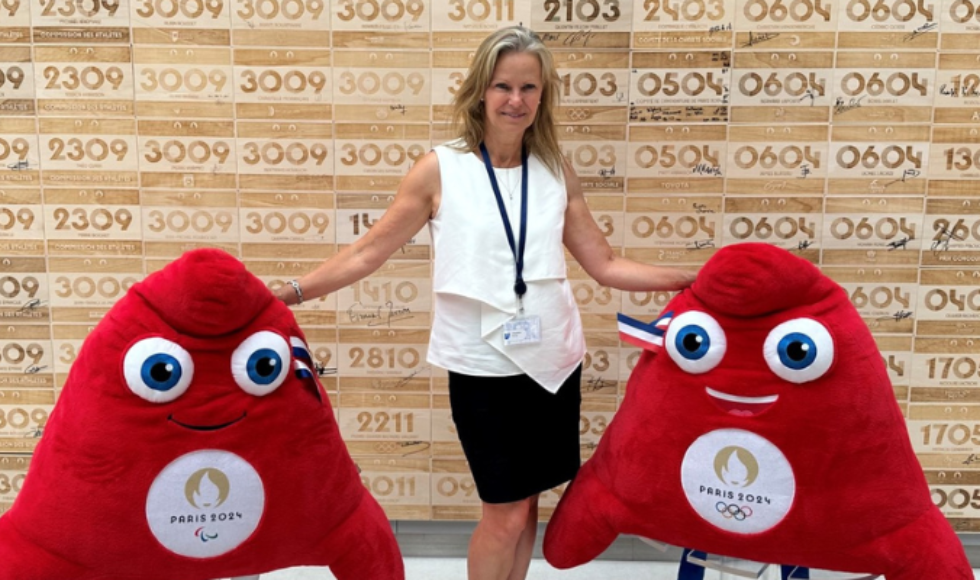‘My passion and privilege’: McMaster clinician-scientist heads to Paris to plan for 2024 Olympics

Margo Mountjoy, a clinical professor in the Department of Family Medicine, is a member of the International Olympic Committee Games Group, which is responsible for the planning and oversight of the medical program at the Olympic Games.
McMaster University is known for its global impact, with some of the brightest minds bringing their discoveries and expertise around the world to advance human and societal health and well-being.
Among those bright minds is Margo Mountjoy, clinical professor in the Department of Family Medicine at McMaster University. Mountjoy recently attended planning meetings in Paris, where she will return next year for the Summer 2024 Olympic Games.
We spoke with Mountjoy about her career, how she got involved in the Olympic Games’ medical program, and why she considers working with elite athletes and those who care for them “rewarding work.”
Tell us about yourself and your work in sports medicine.
I am a clinician-scientist with a sports medicine specialty degree. I am a McMaster medical school and residency graduate, and I completed my PhD at Vrije University in Amsterdam. I am the regional assistant dean at the Michael G. DeGroote School of Medicine, Waterloo Regional Campus. I was a family doctor in Guelph for 25 years and a sports medicine physician at the University of Guelph for 32 years.
In addition to my research and support of graduate students, I work for several international sports organizations including: the International Olympic Committee (IOC) Games Group, the Association of Summer Olympic International Federations where I am the chair of the Medical and Scientific Committee; the World Anti-Doping Association where I am a deputy foundation board member; the FIFA Science Advisory Board; the International Golf Federation Medical Committee and the World Rugby Anti-Doping Advisory Committee. I also chaired the World Aquatics Medical Committee for 20 years. My areas of interest are elite female athlete health, harassment and abuse in sport, and athlete mental health.
How did you get involved in planning for Paris 2024? In what capacity are you involved?
I am a member of the IOC Games Group who are responsible for the planning and oversight of the medical program at the Olympic Games. I began working with this organization in 2005 and have been fortunate to attend nine Olympic Games and three Youth Olympic Games.
My roles in Paris will include oversight and support for the Paris 2024 medical team, support of the International Federations, support for the anti-doping program, education, and research.
What was the goal of your recent trip to Paris?
I was in Paris for four days for a planning meeting to connect with the Paris 2024 medical team about problem-solving challenges and ensuring quality and consistency in health care planning for athletes, coaches and support personnel at the Games — both in Paris as well as on the field of play.
The Olympic Village where the athletes stay is still a construction site, but we were able to tour the Polyclinic — a mini hospital that functions in the Village throughout the Games — as well as the athlete #MentallyFit space which is adjacent to the athletes’ training gym. We are planning to be prepared with ice, ice and more ice!
What sorts of things do you and your colleagues consider in your planning?
There are many components to planning for the Games from a medical perspective. We think about air and water quality, public health risks – the Games in Tokyo were a challenge because of COVID-19, and we hope not to duplicate in Paris! We plan for event risk mitigation; disaster planning; environmental challenges; requirements for pharmaceuticals, both at the Polyclinic and at the sport venues, and physiotherapy, as well as services like dental care and radiology. And much more!
How does it feel to apply your expertise on an international stage for the world’s top athletes?
International sport is my passion and privilege. I am delighted to work with the best in the world — not only the athletes, but the clinicians and researchers. It is a pleasure to share and learn with visiting team physicians from all over the world during the Games, and to collaborate on projects with many individuals in between Games to improve athlete health and safety.
Working with elite athletes is a unique population: physically and mentally. I never cease to marvel at the accomplishments of these incredible individuals. Keeping this population healthy and free from intentional and unintentional harm is both important and rewarding work.


